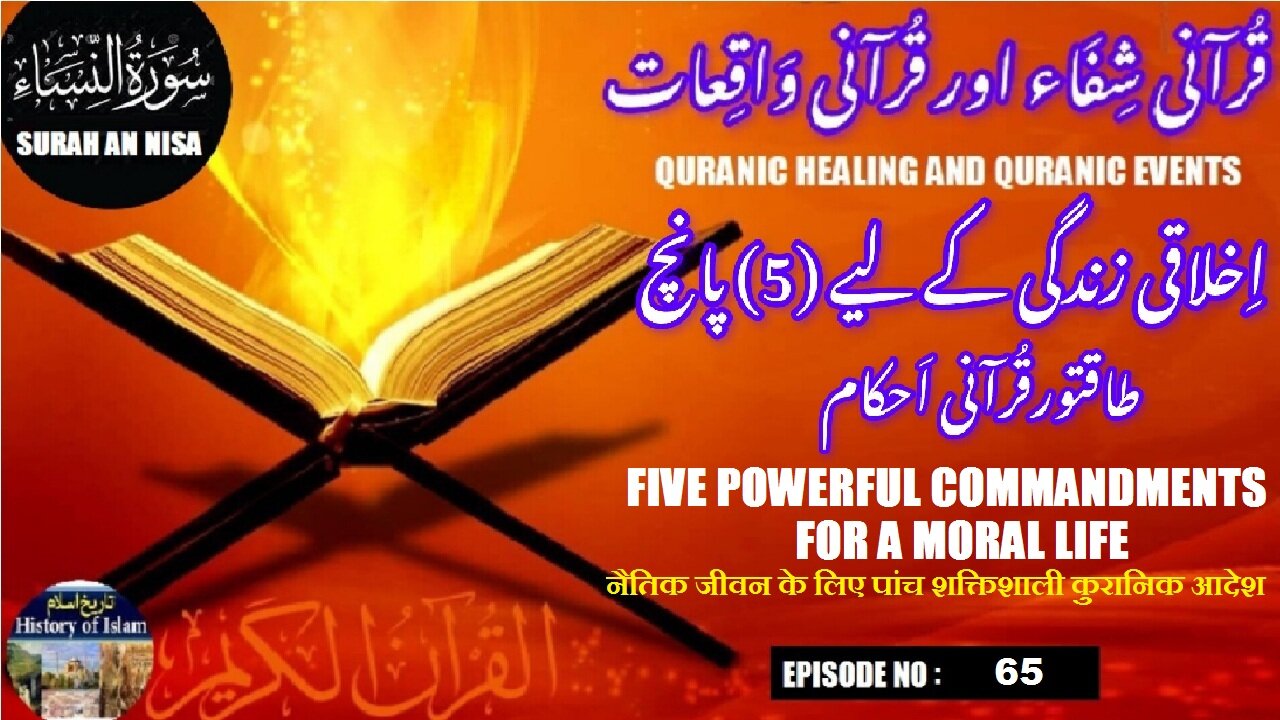Premium Only Content

Five Powerful Quranic Commandments for a Moral Life اخلاقی زندگی کے لیے پانچ طاقتور قرآنی احکامات
@islamichistory813 #healing #and #events #from #the #quran #historical #stories #and #events #quranicstories #selfhealing #success #stories #striking #events #in #history #quranstories, #storiesfromthequran #religious #creation #stories #trending #quran #short #historical #loves #historical #heroes #what #is #true #strength #calm #quran #recitation #for #babies #islamic #healing
Five Powerful Qur'anic Commands for a Moral Life
Brothers, sisters, friends and elders Assalamu Alaikum, wa Rahmatullahi wa Barakatuhu, we are presenting the 65th episode of the Islamic informative video based on healing and events from the Holy Quran, and in this video we will describe,Five Powerful Qur'anic Commands for a Moral Life
Islamic teachings place a strong emphasis on ethics and personal conduct, shaping not just a believer’s relationship with Allah but also their interactions with others. The Qur’an provides a comprehensive framework for moral behavior, encouraging Muslims to embody humility, compassion, integrity, and discipline in their daily lives. Several verses in Surah An-Nisa (Chapter 4) outline essential principles that guide ethical living: avoiding suspicion, spying, and backbiting; refraining from unjust killing; abstaining from approaching prayer while intoxicated; showing kindness to parents, relatives, orphans, the needy, and neighbors; and avoiding arrogance and pride. These commandments collectively form a moral compass that helps Muslims cultivate both spiritual purity and social harmony.
One of the most profound ethical instructions found in the Qur’an is the prohibition against suspicion, spying, and backbiting. While not explicitly listed in Surah An-Nisa, these behaviors are implicitly condemned through teachings that caution believers against making hasty judgments and harming others through words or actions, as seen in verse 4:94. This verse advises Muslims to verify information before acting, especially in matters of life and death. The broader message is clear: a society built on suspicion and gossip cannot thrive. Suspicion breeds mistrust, spying violates privacy, and backbiting undermines relationships. Islam promotes a culture of trust, where personal dignity is respected and preserved. The Prophet Muhammad (peace be upon him) reinforced this principle by stating that a Muslim is one from whose tongue and hands others are safe. Therefore, these ethical injunctions are not merely about individual sin but about protecting the integrity of the community.
Another critical moral command is the prohibition of unjust killing, emphasized in verse 4:93: “And whoever kills a believer intentionally, his recompense is Hell, wherein he will abide eternally…” This stern warning underscores the sanctity of human life in Islam. The Qur’an views life as sacred, a trust from Allah, and it may not be taken except with just cause and due process. The gravity of unjust killing is further magnified by the eternal consequences attached to it. This command is a foundation for Islamic justice and legal systems, emphasizing that violence and aggression have no place in personal grievances or unjustified conflicts. It also serves to cultivate a culture of peace, accountability, and respect for life, where the preservation of human dignity is paramount.
Verse 4:43 introduces a specific command related to personal discipline: “Do not approach prayer while intoxicated until you know what you are saying…” This verse reflects the Qur’anic method of gradually leading believers toward complete abstinence from intoxicants. It connects ethical behavior to spiritual consciousness. Approaching prayer with a clear mind is essential because prayer is not just a ritual but a moment of deep connection with Allah. Intoxication, which impairs judgment and self-awareness, is incompatible with the sincerity and attentiveness required in worship. This instruction serves as a reminder that personal conduct outside of prayer affects one’s spiritual state and that purity in both body and mind is vital to sincere worship. It also lays the groundwork for a lifestyle of self-restraint and responsibility.
The ethical teachings of Islam also emphasize compassion and social responsibility. Verse 4:36 instructs believers to be kind and dutiful to a wide range of individuals: parents, relatives, orphans, the needy, neighbors, and even travelers. This inclusive moral command illustrates the far-reaching nature of Islamic ethics. Kindness is not limited to family but extends to the broader community, including the marginalized and the vulnerable. In this way, Islam fosters a spirit of solidarity and care, where individuals are encouraged to look beyond their self-interest and work toward collective well-being. The repeated mention of orphans and the needy in the Qur’an highlights a divine concern for social justice and the rights of those who cannot advocate for themselves.
The same verse also commands believers to avoid arrogance and pride. These qualities are considered spiritual diseases that distort a person’s view of themselves and others. Arrogance leads to self-righteousness, social division, and the devaluation of others. Islam teaches that all human beings are equal in the sight of Allah, with superiority judged only by piety and good conduct. Humility, therefore, is a cornerstone of Islamic character. The Prophet Muhammad exemplified this throughout his life, living modestly and treating everyone—from the poorest of the poor to tribal leaders—with respect and dignity.
In conclusion, the Qur’anic guidance on ethics and personal conduct, especially as found in Surah An-Nisa, provides a robust and balanced approach to individual and communal life. By urging believers to avoid harmful behavior like suspicion, unjust killing, intoxication, arrogance, and neglect of social obligations, and instead promoting kindness, humility, and responsibility, Islam presents a comprehensive moral framework. These commands aim not just at individual piety but at creating a just, compassionate, and spiritually aware society. Through these principles, believers are called to rise above base impulses and live as moral exemplars, reflecting the divine values of mercy, justice, and respect in their everyday lives.
With this, we ask for your permission until tomorrow and pray to Allah Almighty to grant us the ability to act on the Quran and Hadith, Amen
Allah Hafiz
============================
-
 9:47
9:47
ISLAMIC HISTORY
8 hours agoWhy is Surah Yunus named after Prophet Yunus سورہ یونس کا نام حضرت یونس کے نام پر کیوں رکھا گیا؟
5 -
 LIVE
LIVE
vivafrei
4 hours agoHe Was There! Charlie Kirk Assassination Analysis & Conspiracy Debunking w/ Andrew Piskadlo!
11,784 watching -
 1:05:57
1:05:57
Russell Brand
3 hours agoPfizer Agrees $70 Million Deal With Trump As Study Links Covid Vax to CANCER!! - SF644
61K45 -
 48:25
48:25
JULIE GREEN MINISTRIES
1 hour agoLIVE WITH JULE, ERIC TRUMP AND CLAY CLARK
7.7K23 -
 LIVE
LIVE
Dr Disrespect
5 hours ago🔴LIVE - DR DISRESPECT - BLACK OPS 7 MULTIPLAYER GAMEPLAY - NEW!
1,617 watching -
 LIVE
LIVE
Dr. Drew
4 hours agoFL First Lady Casey DeSantis: Florida Ending ALL Vaccine Mandates, Including For Schools w/ FL Surgeon General Dr. Joseph Ladapo & Tom Renz – Ask Dr. Drew
1,974 watching -
 1:04:57
1:04:57
The Quartering
3 hours agoTrump Tricks Democrats Again, Cheerleader Monster, Abortion Clinics Shutdown & More
66.1K17 -
 7:59
7:59
Dr. Nick Zyrowski
1 year agoHow Much Vitamin D Should I Take
2622 -
 1:23:00
1:23:00
Brandon Gentile
1 day agoJames Lavish: The Red Flag Event Sends Us To $1M Bitcoin & $20K Gold
38 -
 1:23:46
1:23:46
Sean Unpaved
3 hours agoOctober Blitz: Wild Card Game 3s, CFB Coaching Chaos, & TNF Fireworks
27.1K3